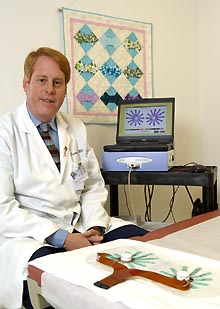|
This is an archived article.
For the latest news, go to the Advance Homepage
For more archives, go to the Advance Archive/Search Page. |
||
|
Researchers Testing New Device
Similar in design to an EKG heart tracing, the device uses an electrical charge to detect very small tumors. The test is known as "homologous electrical difference analysis," or HEDA. If proven effective, it would be used as a prescreening tool before a mammography, ultrasound, or biopsy.
"This would be an important new method for detecting breast cancer very early - when treatment would be most effective and least invasive," says cancer specialist Dr. Scott Kurtzman, an associate professor in the Department of Surgery and the study's lead investigator. Because electricity passes through malignant tissue more easily than through healthy cells, the device allows researchers to measure the levels of obstruction in each breast and then compare the variations between the two breasts. "Finding a difference will be like a red flag," says Kurtzman. "It will tell us if there's an area in the breast that needs more scrutiny - something that may not be evident in a mammogram." According to Kurtzman, the device may be particularly helpful to women in their 30s, because their breasts are denser than those of older women and this makes mammograms more difficult to read, and to young women with a family history of breast cancer who are at higher risk for the disease. The procedure is fast, painless, and does no harm. It involves just one 30-minute visit to the Health Center near the time of physician-ordered mammogram screening. Kathleen Curley, a research nurse coordinator who administers the test in the General Clinical Research Center at the Health Center, says volunteers are still needed. "We're looking for women over age 30, who have not had breast surgery or biopsy, and who have regular mammogram screenings," she says. Volunteers will not receive results from the test. "The study is designed to add to the existing body of information regarding breast cancer detection for the benefit of all women," says Kurtzman. Co-investigator of the study is Dr. Kristen Zarfos, an assistant professor in the Department of Surgery at the Health Center. Funding for the study comes from Z-Tech Inc. of Toronto and Charleston, S.C. |
 he UConn
Health Center is one of 12 sites in North America
and Europe testing a new device to detect very
early breast cancer.
he UConn
Health Center is one of 12 sites in North America
and Europe testing a new device to detect very
early breast cancer.

